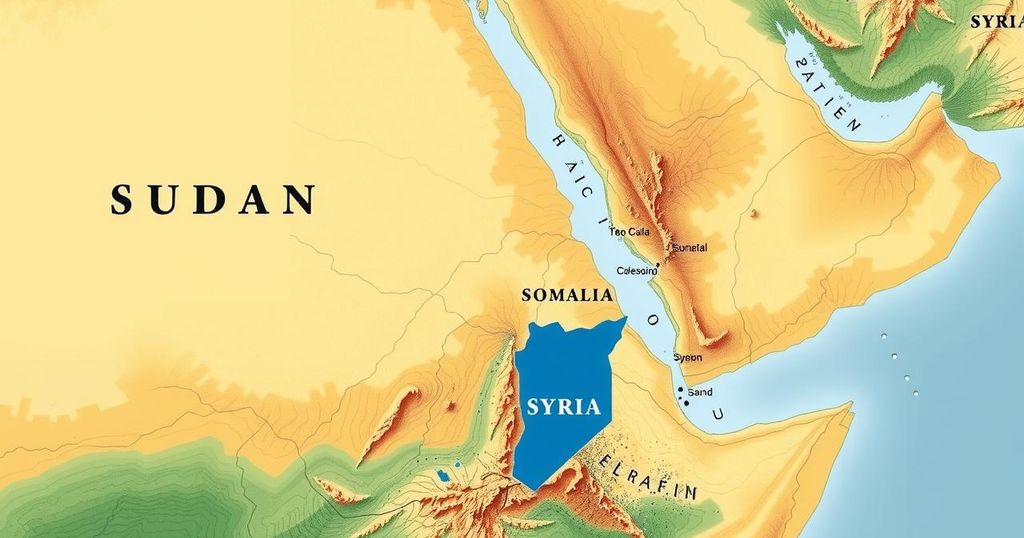The Trump administration and Israel are exploring the resettlement of Gazans in Sudan, Somalia, and Syria as part of efforts to address the ongoing crisis following the Israel-Hamas conflict. President Trump has downplayed expulsion intentions, instead emphasizing migration opportunities to rebuild Gaza. However, these proposals have faced widespread criticism and uncertainties regarding their actual implementation remain. Significant humanitarian challenges persist, with millions of Palestinians already displaced in neighboring countries.
The Trump administration and Israel have explored potential resettlement options for Palestinians from Gaza in Sudan, Somalia, and Syria. This initiative forms part of efforts aimed at ending the conflict between Israel and Hamas and facilitating the recovery of Gaza. Key figures from the Trump team have openly discussed these plans, indicating that the resettlement could help rebuild the region.
During a discussion with the Irish Prime Minister, President Trump clarified, “Nobody is expelling any Palestinians.” He later emphasized a vision where Gaza could transform into the “Riviera of the Middle East” if the Palestinian population could migrate. Trump’s comments suggest a model in which Palestinians could settle in other nations to alleviate the ongoing humanitarian crisis.
Israeli officials have made direct communications with Sudan and Somalia regarding this resettlement plan, while efforts to engage the Syrian government through third parties have been reported. However, responses from Sudan have been absent, and a senior Syrian official claimed no outreach had occurred. Concerns have been raised, particularly from Somalia, regarding the implications of speculative reports on recruitment by extremist groups.
With Gaza’s infrastructure significantly devastated and rampant displacement, Trump proposed a permanent relocation of Palestinians, asserting that Gaza would remain uninhabitable for years. Reports indicate over 90% of housing in Gaza is damaged, resulting in a humanitarian disaster following recent violence. Trump’s positioning on the right of return for Palestinians has been met with widespread condemnation, labeled by some as ethnic cleansing.
Despite Trump’s controversial proposals, Arab leaders have offered alternative post-war recovery plans which were dismissed by the U.S. and Israel. Criticism of Trump’s statements was echoed by Syria’s new leader, Ahmed al-Sharaa, who deemed the resettlement strategy a crime that would fail. Humanitarian experts advocate for direct engagement with the new Syrian government as a means to counter extremism and stabilize the region.
The ongoing Israeli military operations in Syria and discussions around negotiations reflect a complex geopolitical landscape. A State Department spokesperson mentioned ongoing efforts towards achieving a ceasefire agreement and improving conditions for Gazans. Meanwhile, potential relocation discussions remain exploratory, reinforcing the urgent need for a comprehensive solution that offers better living conditions for both Gazans and Israelis.
Presently, millions of displaced Palestinians reside as refugees in neighboring Arab countries. The resettlement debate has intensified calls from far-right Israeli ministers for the migration of Palestinians as part of a broader national strategy. These developments reflect a contentious intersection of political, humanitarian, and security considerations in the region.
The Associated Press provided early insight into the U.S. and Israel’s communications about these resettlement discussions, highlighting the array of complexities that surround potential solutions for Gazans.
The Trump administration and Israeli officials are considering resettling Palestinians from Gaza in Sudan, Somalia, and Syria as part of broader efforts to stabilize the region following the Israel-Hamas conflict. While discussions have begun, many uncertainties remain regarding the feasibility and implications of such plans. Emphasizing humanitarian concerns, experts advocate for clear, stable solutions amid ongoing geopolitical tensions.
Original Source: www.cbsnews.com






